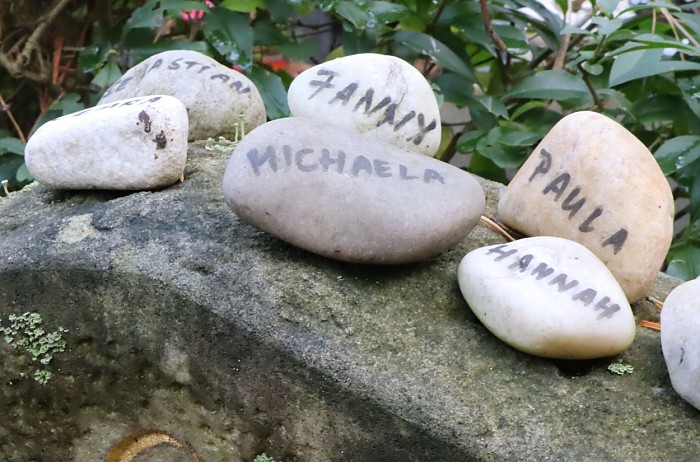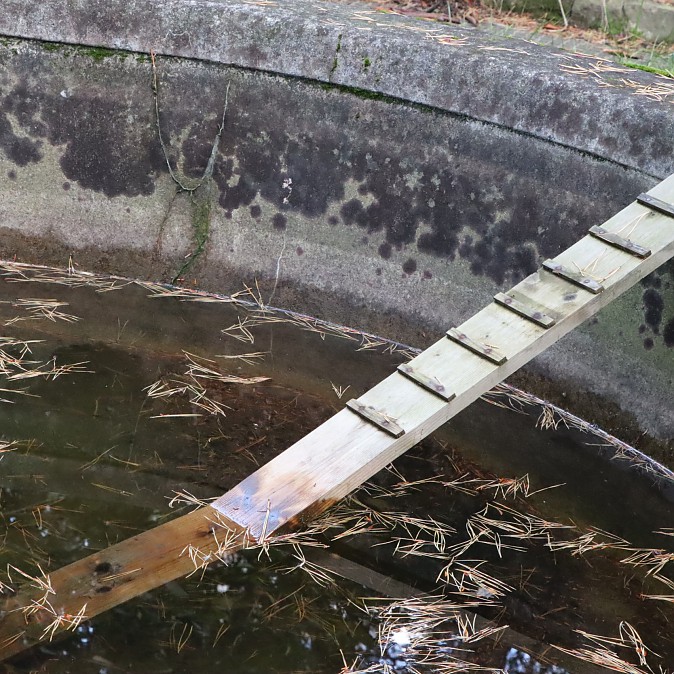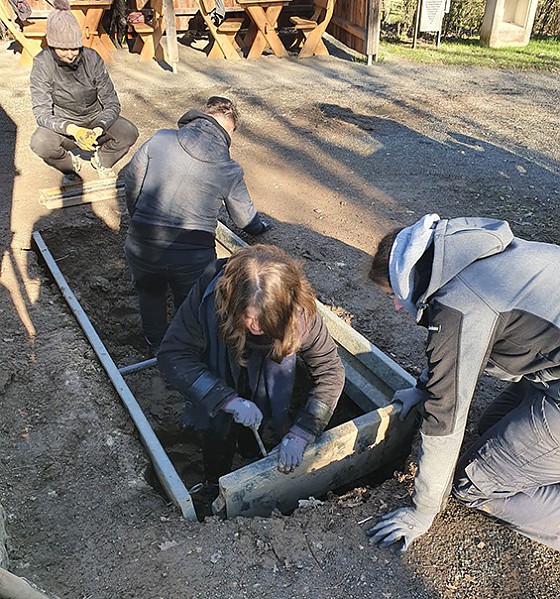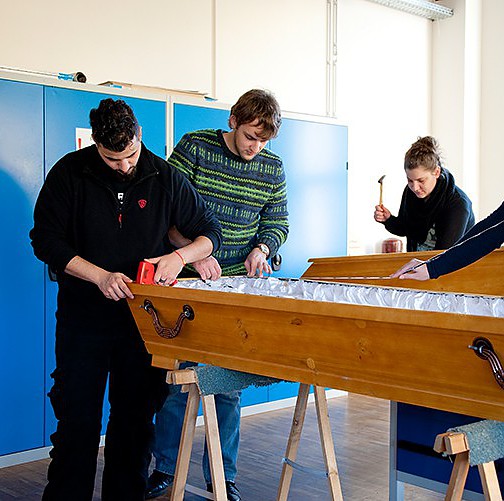

Cemeteries can do more:
The green value of cemetery culture
Cemeteries are places where people are buried and where relatives can bring mourning and remembrance to life. That is their central role. For thousands of years, we have integrated the dead into our lives. We have created a cultural opportunity to deal with the deceased with dignity and to be able to process the pain of loss.
As the culture of burial has changed, so has the cultural and thus social significance of cemeteries. Looking at cemetery culture nationwide, one comes to the conclusion that while the role of the cemetery as a central place of burial and mourning has declined, new important roles have developed that expand the cemetery's social services and functions. These significantly complement the cemetery as a place of interment, mourning and commemoration.
Since 2019, the leading national organizations in the field of cemetery culture have organized themselves into a round table based at the Study Group Cemetery and Monument (Arbeitsgemeinschaft Friedhof und Denkmal e. V.) in Kassel. The aim is to bundle a wide range of competencies in order to be able to communicate and evaluate the possibilities, tasks and services of the cemetery more clearly to a broad public. The "Round Table on Cemetery Culture in the 21st Century" is a forum that discusses current developments and brings them to the public's attention. In addition, it offers the opportunity to develop projects, promote research or even offer support, as is currently the case for the cemeteries massively destroyed by the flood of the century on the Ahr River.
Cemeteries are social places, places of communication, recreation and cultural diversity. In the midst of our cities, which are characterized by asphalt and concrete as well as traffic and noise, they have become oases of contemplation in many places. Well-maintained and publicly accessible green spaces are spheres of biodiversity that have a calming effect on those in mourning or seeking recreation, while at the same time positively influencing the urban microclimate; they also provide flora and fauna with a permanent place to retreat and flourish. Our cemeteries, which have grown over many decades, sometimes centuries, have become repositories of ecological diversity in the midst of our civilization.
Cemeteries are financed through user fees, and these relate to services provided in the area of burial and grave maintenance. However, survivors not only use the farewell hall and gravesite, but they also make a significant contribution to making cemeteries more than places of mourning through their financial and maintenance options. However, if the public services and functions of cemeteries expand to become relevant to society as a whole, the question of how this can be reflected in the financing of cemeteries must be discussed. (see above all the communications of the VFD and the AKF). For this purpose, a comprehensible evaluation basis of all socially relevant functions of the cemetery should be communicated to the local responsible persons, in order to enable a sensitization for the manifold values of our cemeteries in local and state politics, but also towards the general public.

© Museum für Sepulkralkultur, Kassel, Bildarchiv
Statements on the so-called green value of cemeteries were written by the following organizations:
- Study Group Cemetery and Monument e. V.
- Working Group of Municipal Cemeteries (AKF)
- Bundesverband Deutscher Bestatter e. V. in cooperation with the German Funeral Culture Foundation
- Association of German Cemetery Gardeners (BdF)
- Federal Association of German Stonemasons (BIV)
- German Bishops' Conference
- German Society for Garden Art and Landscape Culture (DGGL)
- Board of Trustees Intangible Heritage Cemetery Culture e. V.
- Association of Cemetery Managers in Germany (VFD)
- Association for the Promotion of German Cemetery Culture e. V. (VFFK)
The following aspects can be found as a common consensus in the statements:
- The special ecological importance of the cemetery should receive social attention and recognition.
- The cemetery is to be further developed in harmony with climate, environmental and species protection.
- The issue of sustainability must be established in all areas of funeral culture.
- In all considerations, the needs of the mourners should continue to be the focus.
- In the future, it should be possible to evaluate grave care services and the associated public welfare effects financially and to reflect them in the fees.
Round Table on Cemetery Culture in the 21st Century
The Round Table on Cemetery Culture in the 21st Century is coordinated and moderated by the Study Group Cemetery and Monument (Arbeitsgemeinschaft Friedhof und Denkmal e. V.), and is currently composed of the following organizations (in alphabetical order):
- Association of Cemetery Managers in Germany (VFD)
- Association of German Cemetery Gardeners (BdF)
- Association of Municipal Cemeteries (AKF)
- Association for the Promotion of German Cemetery Culture e. V. (VFFK)
- Board of Trustees Intangible Heritage Cemetery Culture e. V.
- Federal Association for Bereavement Support (BVT)
- Federal Association of German Funeral Directors (BDA) in cooperation with the German Funeral Culture Foundation
- Federal Association of German Stonemasons (BIV)
- German Bishops' Conference
- German Conference of Garden Authorities (GALK)
- German Society for Garden Art and Landscape Culture (DGGL)
- Hessian Association of Towns and Municipalities
- Project "Space for Mourning," online portal trauer/now
- Protestant Church in Germany (EKD)
- Study Group Cemetery and Monument e. V.
Collection of further education and training programs of the participating institutions and associations of the Round Table Cemetery Culture within the Study Group Cemetery and Monument
Networking of all further education and training programs
Please note: This page is incomplete and under construction.
With its Museum for Sepulchral Culture in Kassel, the Study Group Cemetery and Monument (Arbeitsgemeinschaft Friedhof und Denkmal e. V.) currently has a broad offer for education and outreach for children and young people as well as for teachers and educators in the form of workshops, guided tours and the museum suitcase "Vergissmeinnicht" (Forget-Me-Not) for children from 5 – 11 years. Such a mobile participation facility for young people from 11 – 14 years on the topic of "Intercultural Aspects of Death and Dying" is currently under development.
For adult education, the Study Group Cemetery and Monument offers conferences, workshops and seminars for cemetery employees from cemetery administrations, cemetery and tour guides as well as students.
The following institutions and associations involved in the cemetery also offer a variety of continuing education and training programs in the areas of dying, death, burial, mourning and commemoration. These are listed below:
Federal Association of German Morticians
The professional publishing house of the German funeral trade and the Theo-Remmertz-Akademie e. V. provide a wide range of training and continuing education programs for the funeral director trade. Central to this is the uniformly regulated national training program for funeral directors (since 2003) and the advanced training program for funeral directors.
In addition, there are further qualification offers, e.g. as a cremation technician or as a thanatopractor. The specialized publishing house organizes in addition over the entire year a broad seminar program for employees in the funeral industry and in adjacent ranges.
Current information and event dates can be found via the links below.

© BDB

© BDB-Loewinger
>> More information on the respective members will follow here in due course <<
Association of German Cemetery Gardeners in the Central Horticultural Association e. V.
Claire-Waldoff-Straße 7, 10117 Berlin
www.bund-deutscher-friedhofsgaertner.de
Federal Association of German stonemasons
Weißkirchener Weg 16, 60439 Frankfurt/Main
https://cms.bivsteinmetz.de/
Federal Association Bereavement Support
Weinstraße 100, 76889 Klingenmünster
www.bv-trauerbegleitung.de
German Society for Garden Art and Landscape Culture e. V.
Pariser Platz 6, 10117 Berlin
www.dggl.org
Board of Trustees Intangible Heritage Cemetery Culture e. V.
An der alten Mühle 1 b, 59427 Unna
www.kulturerbe-friedhof.de
Space for Mourning
c/o Kunstgießerei Strassacker GmbH & Co. KG, Staufenecker Straße 19, 73079 Süßen
www.raum-fuer-trauer.de
Association for the Promotion of German Cemetery Culture e. V.
Robert-Koch-Straße 33, 46325 Borken
www.vffk.de
Arbeitsgemeinschaft Friedhof und Denkmal e.V.
Zentralinstitut für Sepulkralkultur
Museum für Sepulkralkultur
Weinbergstraße 25–27
D-34117 Kassel | Germany
Tel. +49 (0)561 918 93-0
info@sepulkralmuseum.de








